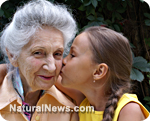
“Elderspeak” Can Negatively Affect Health of Older People
Sunday, November 23, 2008 by: Reuben Chow
Tags: senior citizens, health news, Natural News
- Pfizer faces legal backlash: Texas, Kansas, and more states begin to challenge Prep Act Immunity Shield
- Maple syrup: Nature's golden superfood and its sweet health benefits
- Manufacturing surge under Trump sparks optimism amid concerns over economic strains
- Florida sky mystery: Toxic heavy metals and bioengineered particles found in air and food samples
- Omega-3s: a powerful ally in the fight against chronic inflammation
- Possible biosignatures detected on Exoplanet K2-18b, raising hopes for alien life
- Aerosolized bioweapons? Strange “diploid biomasses” falling out of the sky in Florida captured under the microscope
- Controversy over $400K fund for Texas killer's family sparks outrage: Legal, ethical questions emerge
- HHS Secretary Kennedy will likely investigate the following environmental exposures as CAUSES OF AUTISM and brain damage in children
- Majority of Americans now favor mass deportation of illegal immigrants, polls show shift in public sentiment
- U.S. demands U.K. protect FREE SPEECH, repeal hate speech authoritarianism, in latest trade deal negotiations
- Analysis: The coming economic collapse, a mass uprising and Trump's three secret weapons to halt the growing revolt
- Russia escalates censorship war, targets over 200 VPN apps amid Google resistance
- Cruciferous vegetables deliver TRIPLE the heart benefits than previously known, study reveals
- TAKE IT DOWN Act advances in Congress amid free speech concerns
- Trump's bold trade overhaul reaches a crossroads with Italy, as "fair deals" promise sparks global attention
- “Green Energy Genocide”: Allan Malcolm MacRae’s controversial challenge to the climate change narrative
- BlackRock's Panama port deal stirs debate over Chinese chokehold on strategic shipping routes
- Aerosolized bioweapons? Strange “diploid biomasses” falling out of the sky in Florida captured under the microscope
- Analysis: The coming economic collapse, a mass uprising and Trump's three secret weapons to halt the growing revolt
- Widespread social and economic unrest: Steve Quayle issues urgent financial warning of imminent asset collapse in new interview with Mike Adams
- TAKE IT DOWN Act advances in Congress amid free speech concerns
- Israeli lobbyists boast of controlling US national security policy in leaked AIPAC audio
- Kiss Your Genetic Privacy Good-Bye! 23andMe Gets Green Light to Sell Your Intimate Genetic Details to Anyone They Want
- Mike Adams releases country western hit single: Goin’ Back in Time is Comin’ Home
- U.S. lawmakers investigate Meta over alleged China collaboration
- CLOT SHOT PLANDEMIC UNFOLDING: Fibrous, rubbery clots caused by covid injections have prion-like seeding activity
- Fauci is back in the limelight, and he’s busy promoting a future COVID or FLU pandemic
- Defunding DEADLY mRNA jabs: Government funding for mRNA technology being scrutinized and sidelined until proven "safe and effective" for real
- Russia escalates censorship war, targets over 200 VPN apps amid Google resistance
- Curcumin’s ancient healing power supercharges muscle recovery, and its effects are compounded with anti-inflammatory foods and supplements
- I Want My Bailout Money – new song and music video released by Mike Adams
- I Want My Bailout Money – new song released by Mike Adams
- Government waste exposed: Hegseth supports Musk’s demand for accountability from federal workers
- U.S. approves new Russian ambassador as diplomatic thaw continues
- Federal employees whine over DOGE's new directive requiring them to do a 5-point summary of weekly accomplishments
- Newly released JFK files reveal Pentagon's role in creating Lyme disease and covid in the same lab
- Analysis: The coming economic collapse, a mass uprising and Trump's three secret weapons to halt the growing revolt
- Aerosolized bioweapons? Strange “diploid biomasses” falling out of the sky in Florida captured under the microscope
- Kiss Your Genetic Privacy Good-Bye! 23andMe Gets Green Light to Sell Your Intimate Genetic Details to Anyone They Want
- Mike Adams releases country western hit single: Goin’ Back in Time is Comin’ Home
- European Court of Justice: Healthcare professionals who promoted or administered COVID-19 vaccines are CRIMINALLY LIABLE for any harm caused
- Widespread social and economic unrest: Steve Quayle issues urgent financial warning of imminent asset collapse in new interview with Mike Adams
- Federal employees whine over DOGE's new directive requiring them to do a 5-point summary of weekly accomplishments
- U.S. approves new Russian ambassador as diplomatic thaw continues
- CLOT SHOT PLANDEMIC UNFOLDING: Fibrous, rubbery clots caused by covid injections have prion-like seeding activity
- Government waste exposed: Hegseth supports Musk’s demand for accountability from federal workers
- I Want My Bailout Money – new song and music video released by Mike Adams
- I Want My Bailout Money – new song released by Mike Adams
- Fauci is back in the limelight, and he’s busy promoting a future COVID or FLU pandemic
- Defunding DEADLY mRNA jabs: Government funding for mRNA technology being scrutinized and sidelined until proven "safe and effective" for real
- Trump administration poised to overhaul crypto regulations with new SEC leadership
- Now you can HEAR chemistry: Health Ranger translates molecules into music in stunning video demonstration that will blow your mind (and your ears)
- South Carolina Congressman proposes new $250 bill and wants Trump on the front
- Red Cross issues warning to stop blood plasma donations from vaccinated people
- Scientists confirm: GENIUS brain function can be spontaneously unleashed in humans without any apparent cause
- EPA advisor admits the agency is funneling billions to climate groups ahead of Trump’s return to White House
- HYSSOP: What research reveals about the health benefits of this ancient holy herb
- Two containers with completed ballots fall out of truck in Florida
- Newly released JFK files reveal Pentagon's role in creating Lyme disease and covid in the same lab
- Mike Adams releases country western hit single: Goin’ Back in Time is Comin’ Home
- Global leaders unite to clamp down on “misinformation” with UN-backed Cascais Declaration
- BREAKING: 2025 NDAA authorizes mandatory military draft of WOMEN across America… as Pentagon pursues global NUCLEAR war with both Russia and China at the same time
- I Want My Bailout Money – new song released by Mike Adams
- Michael Yon warns of a ZIONIST TAKEOVER in Trump’s second administration
- The Health Ranger releases “Vaccine Zombie” song and music video, using AI-animated zombies for the music video
- Ozempic and Wegovy weight loss drugs are injectable LIZARD VENOM PEPTIDES that may unleash a devastating wave of organ failure… side effects align with symptoms of SNAKE BITES
- BOMBSHELL: DNA testing kits are a SCAM to develop ethnic-specific bioweapons
- Israeli soldiers accused of even more torture and abuse in the West Bank
- These 13 countries just signed an agreement to engineer a global FAMINE by destroying food supply
- RFK Jr. clears key hurdle: Sen. Susan Collins backs controversial HHS nominee, signaling a new era for health policy
- NASA admits that climate change occurs because of changes in Earth’s solar orbit, and NOT because of SUVs and fossil fuels
About Elderspeak
What is elderspeak? Broadly speaking, it is a style which is assumed to accommodate the perceived communication needs of elderly people. It involves speaking slowly, restrictions on vocabulary, simplified syntax, as well as exaggerated prosody.
The fundamental assumption behind elderspeak is that the elderly are cognitively impaired, and thus need some "help". It can be said to be patronizing and disrespectful to the older adult.
Researchers have also defined elderspeak as overly caring, controlling and infantilizing communication.
Findings from Studies
In a study led by Becca Levy, a professor at the Yale School of Public Health, it was found that elderly folks who were exposed to negative stereotypes commonly associated with ageing, enforced by condescending phrases and attitudes, performed significantly worse when tested for memory and balance.
In one particular town in Ohio, her study team found that those who were above 50 and held positive perceptions about ageing went on to live 7.5 years longer than their peers who did not. This was after other health-affecting factors were already accounted for.
Those attitudes were affected even by apparently harmless words and phrases and, profoundly, they supposedly had a greater impact than important factors such as smoking and exercise.
Elsewhere, Kristine Williams, R.N., Ph.D., an associate professor at Kansas University, studied the effect of elderspeak on Alzheimer's patients with dementia. The interaction between staff and 20 residents of a nursing home, aged between 69 and 97 years and having moderate levels of dementia, were videotaped.
The study found that the patients were more likely to resist care after they were spoken to using elderspeak, instead of the usual adult-to-adult form of communication. When resisting care, they would carry out actions such as saying no or crying out, turning away, grabbing onto someone or something, pulling their limbs tightly toward the body, or hitting and kicking.
"There's the suggestion that these people are unable to communicate that their needs aren't being met. And because they can't communicate verbally, they may respond in these other nonverbal ways," Dr Williams said. And, according to her, the need in question could just be the wish to be treated as an adult who is worthy of respect.
And, perhaps somewhat ironically, the biggest culprits of elderspeak are often healthcare workers, including doctors and nursing staff.
The Problem with Elderspeak
The problem with elderspeak, is that it hurts the self-esteem of those to whom it is used on. Worse, it can literally grind them down and send them on a self-fueling downward spiral toward ill health and even premature death. That, after all, is what we get when we communicate to people that they are weak, a liability, incompetent or even useless – they often prove us right!
"Elderspeak is indicative of general negative stereotypes of the elderly. It is another example of how people are treated differently based on their age in healthcare, in the workforce and in everyday life. And we have found a clear connection between how the elderly are treated and their health and functioning," said Dr Levy.
The Bottomline
"Daily we are witness to, or even unwitting participants in, cruel imagery, jokes, languages and attitudes directed at older people," said Dr Robert Butler, president of the International Longevity Centre-USA, who first coined the term "ageism" some 40 years ago.
With populations ageing in the US and in many developed nations, the need to avoid elderspeak becomes all the more significant. In the US, the 85-and-above age group is the fastest-growing one.
Ms Elaine Smith, a 78 year old retired Chicago schoolteacher, who was subject to elderspeak when she was hospitalized for two months after suffering a fall, said that people can become quite indignant when she tells them she is offended by such a communication style. And she has an interesting viewpoint regarding elderspeak.
"But I believe that the people who heap these endearments upon us are reacting to their own fears of ageing in a youth-oriented culture," she said. Her advice? Get over it.
So, the next time we want to use terms such as "dear", "good girl" and "sweetie" on the elderly, or speak very slowly and in overly simplified language to them, we better think again.
Main Source
Talking down to the elderly is bad for their health, medical study finds (http://www.telegraph.co.uk/health/article325...)
About the author
Reuben Chow has a keen interest in natural health and healing as well as personal growth. His website, All 4 Natural Health, offers a basic guide on natural health information. It details simple, effective and natural ways, such as the use of nutrition, various herbs, herb remedies, supplements and other natural remedies, to deal with various health conditions as well as to attain good health. His other websites also cover topics such as depression help, omega 3 fatty acids, as well as cancer research and information.Senior citizens at FETCH.news
Get independent news alerts on natural cures, food lab tests, cannabis medicine, science, robotics, drones, privacy and more.
Take Action: Support Natural News by linking to this article from your website
Permalink to this article:
Embed article link: (copy HTML code below):
Reprinting this article:
Non-commercial use OK, cite NaturalNews.com with clickable link.
Follow Natural News on Facebook, Twitter, Google Plus, and Pinterest
Science News & Studies
Medicine News and Information
Food News & Studies
Health News & Studies
Herbs News & Information
Pollution News & Studies
Cancer News & Studies
Climate News & Studies
Survival News & Information
Gear News & Information
News covering technology, stocks, hackers, and more



"Big Tech and mainstream media are constantly trying to silence the independent voices that dare to bring you the truth about toxic food ingredients, dangerous medications and the failed, fraudulent science of the profit-driven medical establishment.
Email is one of the best ways to make sure you stay informed, without the censorship of the tech giants (Google, Apple, Facebook, Twitter, YouTube, etc.). Stay informed and you'll even likely learn information that may help save your own life."
–The Health Ranger, Mike Adams












































